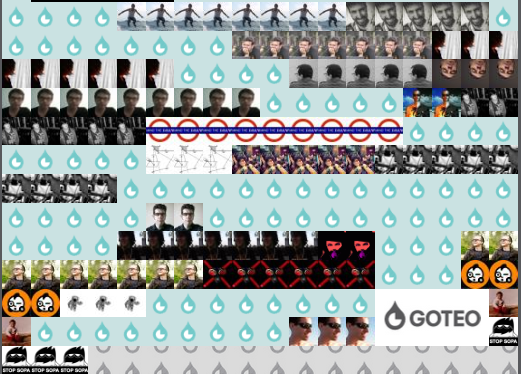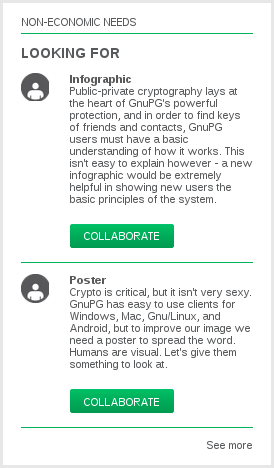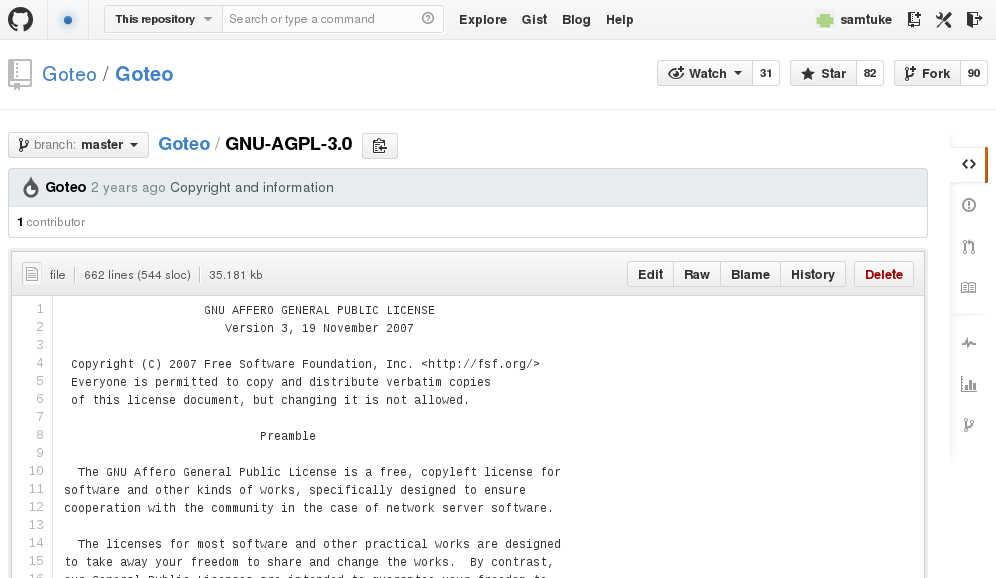How good is Goteo? An appraisal
Posted 30th December 2013 by Sam Tuke

Figure 1: A wall of donor faces on Goteo
"One question: why did you choose the quite unknown Spanish crowdfunding site Goteo?" So shot back the reply to the press release I had just sent to a few dozen selected journalists announcing the launch of the GnuPG crowdfunding campaign. "You won't get any exposure on there, we got a few hundred thousand hits just from being on indiegogo" I was told by one experienced crowdfunder at my favourite Berlin hackerspace last month. "What's Goteo?" has been one of the most frequently asked questions of this campaign from friends and supporters.
I ummed and ahhed over which crowfunding platform to choose. It's a decision that has a huge impact on the campaign - market exposure, transaction costs, and design and layout are just a few of the many factors that have to be taken into account. This is a crowded market - new crowdfunding sites are popping up each week as more companies try to cash in on what is recognised a key tech trend of 2013. An estimated $5bn was raised by crowdfunders this year. That equates to around $35m in commission fees for the platforms hosting these campaigns, who typically charge between 5-10%. It's no surprise that everyone wants a slice.

Figure 2: "Non-economic donations"
Goteo however, is unique. Right now it's the only crowdfunding software that is itself Free Software, allowing everyone to inspect how it works and run their own copy. Even though I don't plan to run my own Kickstarter competitor any time soon, the fact we can check its code, make improvements, and follow the development process is really important. I want Goteo to prosper profitably because, aside from all its other good points, I know some of that profit will be invested in the platform itself, which shall remain free and accessible to everyone under the terms of the AGPL3 license.
Goteo is also the only such site to my knowledge that's built with public money. Funded by Spain's Department for Education, Culture and Sport, Barcelona's City Council, and The University of Andalucia, Goteo exists to host projects which "contribute to the common good, free knowledge, and open code". Everything about the platform and the projects it hosts point to common goods, shared resources, and collaborative effort.
Besides that, these other features make it stand out:
- Signup and donation workflow is smooth and simple
- Great focus on social media and sharing links (we had hundreds of tweets from these)
- Users can login with many social networks, including OpenID and LinkedIn
- Clean and professional design with easy access to key information
- Built in license chooser for all "goods" projects produce (categories for software, artwork, etc.)
- Mandatory delivery timeframe / deadline setter with public calendar
- Nice "image wall widget" of donors faces has potential, provides public recognition of donations
- Web forms for project creation are comprehensive and well designed
- Crowdsourcing of extra skills ("non-economic donations") works well
- Donations are guaranteed by PayPal and Goteo, not pledged or retractable
- Goteo staff are friendly and knowledgable, providing personal guidance and assistance
- Many funding successes, including a few related to hardware, software, and Hackerspaces
Many of those benefits are obvious before launching a campaign. However, on the list of problems I experienced with the platform, most weren't discovered until the point of execution (orange = fix in progress):
- User-set passwords are automatically emailed in plain text after registration (insecure)
- Rewards can't be customised, e.g. select t-shirt size
- Once a campaign is launched, no aspect can be edited directly (though news can be added)
- The order of images for the campaign page is random - the first image visitors see can't be specified
- The launch date of the campaign is chosen by Goteo administrators, it can't be specified
- No markup is available for text formatting
- Pictures are limited and can't be placed between text to break up the page
- There's a bug that causes double posting of news items
- Shipping for rewards is not configurable - international shipping can't be billed
- The website is not mobile friendly (minimum page width is 940px)
- HTTPS is not available to donors for transferring personal details
Besides that, I spotted a few opportunities for improvement:
- Send emails to people who didn't complete their donation ("abandoned carts" - indiegogo does this)
- Allow managers to specify the content of social media messages

Figure 3: Goteo's license on GitHub
Some of the problems listed are a real pain. Because I couldn't choose the launch date, and hadn't planned for an in-depth human review by Goteo, our project went public days later than I expected, at a time when I was travelling and without connectivity. Goteo's campaigns team is helpful and responsive however, and even in the last few weeks several translation problems have been fixed which I had previously reported. I'm confident that the other most serious issues will be addressed in a timely manner.
In all, we took a gamble by using Goteo, but one that paid off. It's focus on communal work and rewards is unique amongst its competitors, and when it comes to copyleft licensing they stand alone in practicing what they preach. Nearly all the convenient features that you'd expect from more established platforms are included, together with a pleasant functional interface. Donations are worry-free for both donors and recipients (though I can't comment on the final transfer process until later next month).
Best of all perhaps, staff at Goteo are knowledgable and supportive and have time to invest in making projects a success. And when launch day comes and you're expecting the unexpected, that's very reassuring.


